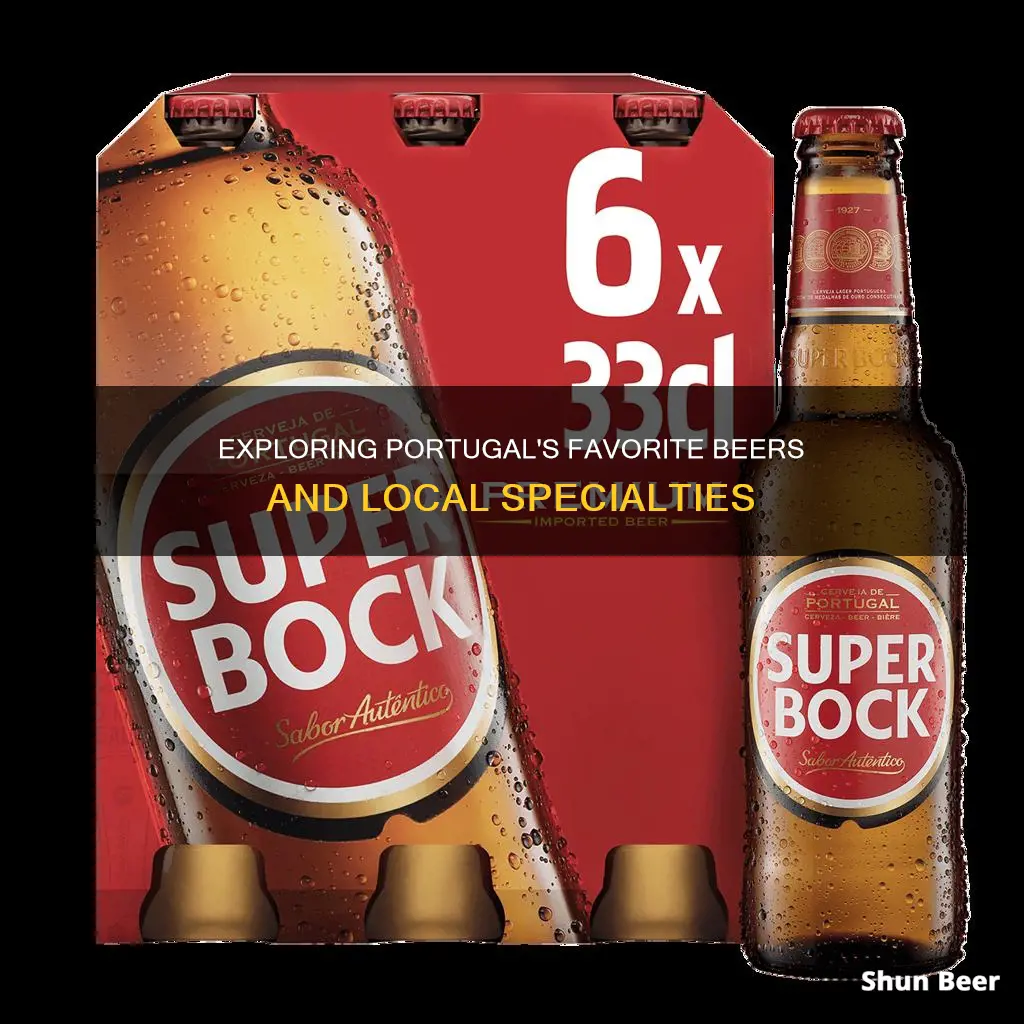
Portugal is known for its wine, but its beer is also worth a try. Beer has a long history in Portugal, dating back to when the country was the Roman province of Lusitania. Today, Portugal is one of the largest beer producers in Europe and its seventh-largest exporter. While the country is not as celebrated for its beer as Germany or Belgium, it has a thriving craft beer scene and two major beer brands: Sagres and Super Bock.
| Characteristics | Values |
|---|---|
| Beer names | Cerveja, Imperial, Fino, Lambreta, Caneca, Girafa, Mini, Bejeca, Jola, Panaché, Tango |
| Beer size | 15cl, 20cl, 25cl, 50cl, 1l |
| Beer brands | Sagres, Super Bock, Coral, Cristal, Bohemia, Cergal, Imperial, Trindade, Zarco, Especial, Maldita, Cintra, Prima, Tagus |
| Beer types | Stout, Ale, Lager |
| Beer consumption | 50 litres per person per year |
| Brewery | Fábrica de Cerveja da Trindade, Cervejaria Trindade, Sociedade Central de Cervejas, Unicer, Central de Cervejas, Heineken International, Empresa de Cervejas da Madeira, Fábrica de Cervejas e Refrigerantes João Melo Abreu, Faustino Microcervejeira, Font Salem, Super Bock Group |
| Brewery location | Lisbon, Porto, Leça do Balio, Matosinhos, Madeira |
| Craft beer brewers | Dois Corvos, Oitava Colina, Musa, Lupum, Nortada, Sovina |
What You'll Learn

Beer names and sizes vary across Portugal
The names for beer also differ depending on the context. For instance, when inviting friends for a beer, you might ask them to join for a "bejeca" or a "jola". When referring to beer in a more informal context, "cerveja" can also be shortened to "cervejola" or "cervejinha".
Beer mixes are also common in Portugal. A mix of beer and Sprite/7up is called a "panaché", while adding currant creates a fruity beer called a "tango".
In addition to the major brands, Portugal also has around 100 small breweries dedicated to producing craft beer. Some of the most renowned craft brewers include Dois Corvos (Two Crows), Oitava Colina (Eighth Hill), Musa (Muse), Lupum, Nortada (North Wind), and Sovina (Miser).
Kicking the Beer Habit: Strategies for Cutting Down
You may want to see also

Sagres and Super Bock are the two biggest beer brands
Super Bock, on the other hand, is the market leader in Portugal, with over 40% of total beer sales and a strong presence in most Portuguese bars and restaurants. The brand is produced by Unicer, a company based near Porto in northern Portugal. Unicer offers a range of strong, pale lagers, as well as a dark beer, a stout, and a low-alcohol option. Super Bock has also gained international recognition and can be found in supermarkets in the UK and Japan.
While Sagres and Super Bock dominate the market, other popular Portuguese beer brands include Coral, Cristal, Bohemia, Cergal, Imperial, Trindade, and Especial.
Shout Stain Remover: Beer Stain Solution?
You may want to see also

Portuguese beer history dates back to the Roman province of Lusitania
The province of Lusitania encompassed most of modern-day Portugal, south of the Douro River, and a large portion of western Spain, including the present-day Extremadura and Province of Salamanca. The Romans named the region after the Lusitanians, an Indo-European tribe that inhabited the lands.
The ancient Roman province of Lusitania, beer was commonly made and drunk. The word for beer in Portuguese, "cerveja," is derived from the Latin word "cerevisia." Beer and wine are extremely popular in Portugal, with beer being the third most popular drink after water and tea.
Portugal is one of the largest beer producers in Europe and is the seventh-largest exporter on the continent. The country had seven major breweries in 2003, employing approximately 1,848 people. In addition, there are around 100 small breweries dedicated to craft beer production.
The beer market in Portugal is dominated by two major companies: Sociedade Central de Cervejas, S.A. and Unicer - Bebidas de Portugal, S.A. These companies control more than 90% of the market and produce well-known brands such as Sagres, Super Bock, Cristal, and Bohemia.
The Ice-Cold Beer Debate: Is It Taboo to Add Ice?
You may want to see also

Craft beer has become popular in the 21st century
Beer is the third most popular drink in Portugal, after water and tea. While the country has a long history of beer production and consumption, craft beer has only recently gained popularity in the 21st century.
Portugal's first official brewery was established in the 19th century, but beer was largely imported until then, facing opposition from local wine producers. In the 20th century, dictator António de Oliveira Salazar excluded foreign businesses to promote national brands, and Sagres and Super Bock held a monopoly on beer. However, the Carnation Revolution in 1974 ended this initiative, opening the doors for a new generation of brewers.
In recent years, Lisbon's drinking scene has undergone a remarkable shift, with craft beer at the forefront. This change has been driven by the emergence of new brewers creating innovative recipes and expanding the category of Portuguese craft beer. Drinking habits have evolved, with people now seeking out specific craft beers and developing a taste for different styles, such as IPAs.
The craft beer movement in Portugal is characterised by a diverse range of brewers, from well-known names like Dois Corvos and Musa to smaller nano-breweries like AMO. These brewers produce a variety of beer styles, with stout, ale, and lager being the most common. The rise of craft beer has also led to the development of dedicated craft beer bars in Lisbon, such as Cerveteca and Duque, which offer a wide range of artisanal brews.
The popularity of craft beer in Portugal can be attributed to several factors. Firstly, it offers a unique and diverse range of flavours compared to mass-produced beers. Secondly, it caters to the changing preferences of young adults, who are often willing to experiment with different beer styles. Finally, the emergence of local craft brewers has fostered a sense of community and supported the growth of local businesses.
Drinking Beer with a Straw: Yay or Nay?
You may want to see also

Beer is the third most popular drink in Portugal
Portuguese beer brands may not be as well-known globally as their wine counterparts, but they are certainly worth a taste. The country boasts a variety of mass-produced and locally crafted beers. Two companies, Sociedade Central de Cervejas, S.A. and Unicer - Bebidas de Portugal, S.A., control more than 90% of the Portuguese beer market. These companies produce well-known beers such as Sagres and Super Bock, which account for a significant portion of total beer consumption in Portugal.
When ordering a beer in Portugal, it's important to know the local terminology. The word for beer in Portuguese is "cerveja", and the standard size for a draught beer is 300 ml. However, different regions in Portugal have unique names for beer sizes. For example, in Lisbon, people typically order an "imperial" (20cl), while in Porto, the same size is called a "fino". If you're feeling thirsty, you can order a "caneca" (50cl) or a "girafa" (1L).
In recent years, craft beer has gained popularity in Portugal, with microbreweries popping up across the country. These breweries produce a variety of beer types, with stout, ale, and lager being the most common. Some renowned craft brewers in Portugal include Dois Corvos, Oitava Colina, Musa, Lupum, Nortada, and Sovina.
So, whether you're sipping a cold Sagres or Super Bock at a local bar or exploring the diverse offerings at a craft brewery, beer is definitely worth a cheers when visiting Portugal!
Beer at Work: German Work Culture Explored
You may want to see also
Frequently asked questions
Sagres and Super Bock are Portugal's biggest beer brands, accounting for 90% of total beer consumption in the country. Other popular beer brands include Coral, Cristal, Bohemia, Cergal, Imperial, Trindade, Zarco, Especial, Maldita, Cintra, Prima, Tagus, and Cristal.
The word for beer in Portuguese is cerveja, which comes from the Latin word cerevisia.
Ordering a beer in Portugal depends on the size and location. In Lisbon, most people order an "imperial" (20cl beer), while in Porto, the same drink is called a "fino". A draft beer served in a 15cl glass is called a "lambreta". A "caneca" is 50cl and a "girafa" is 1L. A bottle of beer is called a "cerveja" and a small bottle (25cl) is a "mini".
Portugal is famous for its wine, and Portuguese locals often add citrus to their drinks to cut through the sugariness. Ginjinha, a sour cherry liqueur, is a favourite among tourists and locals. Port Wine, produced in the Douro Valley region in northern Portugal, is also a popular fortified wine.
Beer has a long history in Portugal, dating back to the time of the ancient Roman province of Lusitania. Contemporary Portuguese beer dates back to the early 20th century when modern breweries were established.







